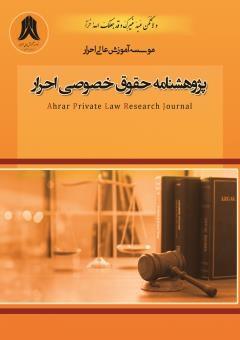Examining The Terms Of Foreclosure And Comparing It With Late Payment Damages
Subject Areas : Civil Law
Fatemeh Jameei
1
,
Hirad Mokhayeri
2
![]() ,
mohsen poormohammad
3
,
mohsen poormohammad
3
1 - PhD in Private Law, Department of Law, Faculty of Humanities, Central Tehran Branch, Islamic Azad University, Tehran, Iran.
2 - PhD in International Relations, Department of Political Science, Faculty of Humanities, Zanjan Branch, Islamic Azad University, Zanjan, Iran.
3 - Assistant Professor, Department of Islamic Studies, Department of Islamic Studies, Faculty of Paramedicine, Midwifery Nursing, Hazrat Zainab Langroud, Gilan University of Medical Sciences, Rasht, Iran.
Keywords: Usuryin exchange, goods of the same kind , Makil and Mozon, damages for delay in payment, sanctity of payment sanctity of usury, legitimacy of payment,
Abstract :
Transactions in the form of trade in goods have long been common And sometimes in such transactions one of two items of the same type that are of equal weight, On the other hand, it is exchanged in excess on one side and causes the realization of one of the types of usury called "exchange usury".There is also another type of increase in assets in transactions in which one party does not fulfill its obligation on time and as a result causes a loss to the other party and must compensate the damage caused by this delay, which is called "payment delay compensation".Since both of these issues increase the other party's assets,In the present study, while examining the exchange usury, the conditions of its realization and comparing it with the compensation for late payment in these respects, in response to the question that "Is obtaining compensation for late payment one of the examples of usury and is it sanctity or legitimate like exchange usury?"Examining the prohibition of usury and also mentioning the reasons for the legitimacy of late payment damages, we came to the conclusion that although some consider imposing a penalty for late payment as a trick to receive usury.However, several legal articles indicate its acceptance by the legislator, and it is considered legitimate by most jurists for various reasons, and it is not sanctity usury.
